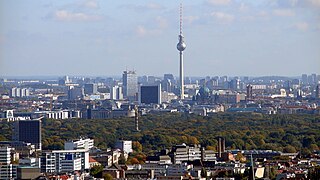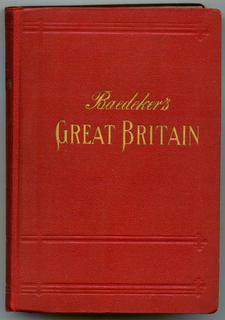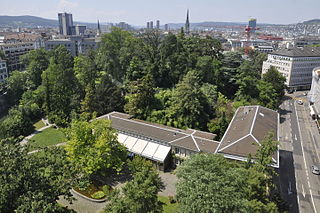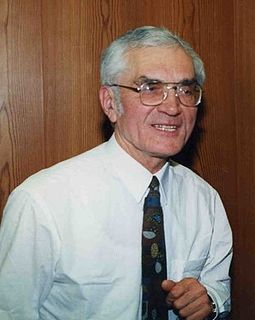The Historical Archive on Tourism (HAT, German: Historisches Archiv zum Tourismus) is sited in the city of Berlin at the Technische Universität Berlin where it is housed at the Center for Metropolitan Studies (CMS) and the Zentrum Technik und Gesellschaft (ZTG). The HAT had been founded in 1986/87 at the Freie Universität Berlin; in 2011 international protests helped to avert a planned shut-down of the archive [1] and the following year it moved from the Free to the Technical University. [2] [3] [4] Since 1999 the HAT is headed by the historian Hasso Spode and co-financed by the Willy-Scharnow-Foundation.

German is a West Germanic language that is mainly spoken in Central Europe. It is the most widely spoken and official or co-official language in Germany, Austria, Switzerland, South Tyrol (Italy), the German-speaking Community of Belgium, and Liechtenstein. It is also one of the three official languages of Luxembourg and a co-official language in the Opole Voivodeship in Poland. The languages which are most similar to German are the other members of the West Germanic language branch: Afrikaans, Dutch, English, the Frisian languages, Low German/Low Saxon, Luxembourgish, and Yiddish. There are also strong similarities in vocabulary with Danish, Norwegian and Swedish, although those belong to the North Germanic group. German is the second most widely spoken Germanic language, after English.

Berlin is the capital and largest city of Germany by both area and population. Its 3,748,148 (2018) inhabitants make it the second most populous city proper of the European Union after London. The city is one of Germany's 16 federal states. It is surrounded by the state of Brandenburg, and contiguous with its capital, Potsdam. The two cities are at the center of the Berlin-Brandenburg capital region, which is, with about six million inhabitants and an area of more than 30,000 km², Germany's third-largest metropolitan region after the Rhine-Ruhr and Rhine-Main regions.

The Free University of Berlin is a research university located in Berlin, Germany. One of Germany's most distinguished universities, it is known for its research in the humanities and social sciences, as well as in the field of natural and life sciences.
Step by step the collection was enlarged with material about historical travel and tourism research. Today the length of the shelves amounts to some 600 running meter. The focus of the material is not so much on "travel" generally but on "tourism" as a special sort of travelling. The HAT is gathering various materials ranging from Baedekers to private photo albums, in particular there is an extensive collection of flyers and other so-called ephemera. Mainly the material stems from Central Europe, in particular from Germany, but nearly all other parts of the world are also represented, e.g. Southern Africa or USA.

Tourism is travel for pleasure or business; also the theory and practice of touring, the business of attracting, accommodating, and entertaining tourists, and the business of operating tours. Tourism may be international, or within the traveller's country. The World Tourism Organization defines tourism more generally, in terms which go "beyond the common perception of tourism as being limited to holiday activity only", as people "traveling to and staying in places outside their usual environment for not more than one consecutive year for leisure and not less than 24 hours, business and other purposes".

Verlag Karl Baedeker, founded by Karl Baedeker on July 1, 1827, is a German publisher and pioneer in the business of worldwide travel guides. The guides, often referred to simply as "Baedekers", contain, among other things, maps and introductions; information about routes and travel facilities; and descriptions of noteworthy buildings, sights, attractions and museums, written by specialists.

A flyer is a form of paper advertisement intended for wide distribution and typically posted or distributed in a public place, handed out to individuals or sent through the mail. In the 2010s, flyers range from inexpensively photocopied leaflets to expensive, glossy, full-color circulars.
Over 50,000 leaflets are stored, and more than 250 journals and some 12,000 books are registered. In addition statistics, posters and maps are gathered. The bulk of the material is from the 19th and 20th century, some books date back to around 1600. No OPAC is installed but lists of titles are published in the Internet. [5]

Statistics is a branch of mathematics dealing with data collection, organization, analysis, interpretation and presentation. In applying statistics to, for example, a scientific, industrial, or social problem, it is conventional to begin with a statistical population or a statistical model process to be studied. Populations can be diverse topics such as "all people living in a country" or "every atom composing a crystal". Statistics deals with every aspect of data, including the planning of data collection in terms of the design of surveys and experiments. See glossary of probability and statistics.

A poster is any piece of printed paper designed to be attached to a wall or vertical surface. Typically posters include both textual and graphic elements, although a poster may be either wholly graphical or wholly text. Posters are designed to be both eye-catching and informative. Posters may be used for many purposes. They are a frequent tool of advertisers, propagandists, protestors, and other groups trying to communicate a message. Posters are also used for reproductions of artwork, particularly famous works, and are generally low-cost compared to the original artwork. The modern poster, as we know it, however, dates back to the 1840s and 1850s when the printing industry perfected colour lithography and made mass production possible.

A map is a symbolic depiction emphasizing relationships between elements of some space, such as objects, regions, or themes.











